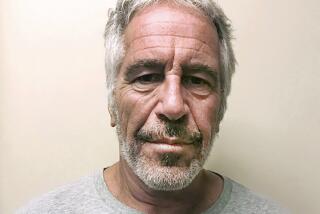30 Brokerages Agree to Pay $1 Billion to Settle Class-Action Suit
- Share via
Thirty of Wall Street’s biggest firms agreed on Wednesday to pay investors nearly $1 billion to settle a class-action lawsuit alleging that the firms colluded to fix prices on the Nasdaq Stock Market.
The deal is the largest civil antitrust settlement in history, lawyers said.
“It’s a resounding victory,” said Leonard Simon, an attorney at Milberg Weiss Bershad Hynes & Lerach. “This is the amount we targeted.”
The settlement, if ultimately approved by U.S. District Judge Robert Sweet in New York, would increase to $1.01 billion the total to be paid by brokerages to settle the 1994 price-fixing suit. Six other brokerages previously agreed to pay a total of $98.9 million to investors. A hearing is set for Monday.
The firms that would pay the most under the settlement are Merrill Lynch & Co., which is to pay just under $100 million; Lehman Bros. Inc., which is to pay at least $80 million; Goldman Sachs & Co., to pay $75 million; Salomon Smith Barney, which is to pay at least $70 million; and Morgan Stanley, Dean Witter, Discover & Co., to pay $65 million.
The firms denied any wrongdoing. Officials from several companies could not be reached. Nine other large brokerages, including Lehman Bros. and Goldman Sachs, declined comment.
A spokesman for Smith Barney who requested anonymity said the firm was glad the case was settled.
“We are pleased that this chapter is now closed for the industry,” he said.
Mike Shokouhi, spokesman for the National Assn. of Securities Dealers, which operates Nasdaq, said the organization had no comment.
Charles Schwab Corp., the nation’s largest discount brokerage and owner of the Mayer & Schweitzer trading firm, said: “The company believes that these allegations are unfounded and denies that Mayer & Schweitzer engaged in any wrongdoing.”
Investors alleged that between 1989 and 1994 the companies’ securities dealers conspired to keep the gap between prices for buying and selling a stock artificially wide. That made trades more expensive for investors.
Just how much each investor would receive depends on how much trading they did. Simon said lawyers must come up with a formula based on how many trades they made and what stocks they bought and sold.
“Although we believe our practices were entirely proper, it made no sense to continue litigating the merits of practices that are no longer followed when the matter could be resolved on an industrywide basis,” said Merrill Lynch spokesman Bill Halldin.
The suit contended that as many as several million investors lost hundreds of millions of dollars because of collusion among 37 firms. This collusion caused an artificial widening of spreads--the difference between the prices at which stocks were bought and sold, the complaint alleged. Wider spreads add to dealers’ profits.
The suit was filed soon after the Securities and Exchange Commission and the Justice Department began investigations in 1994. The SEC last year censured the NASD, which runs Nasdaq, for turning a blind eye to dealers’ price collaboration. The NASD, which agreed to spend an additional $100 million on enforcement, has previously neither admitted nor denied wrongdoing.
The SEC, following up on last year’s settlement with the NASD, is now preparing charges against dozens of securities firms on allegations they collaborated to keep spreads artificially wide. The Justice Department filed antitrust charges last year that were settled by 24 of the firms that settled the suit Wednesday. These brokerages agreed to tape-record some of their traders’ calls and take other steps to protect investors.
One defendant in Wednesday’s case, Robertson Stephens, opted out of the settlement and said it would contest the investors’ allegations on its own.
The payments aren’t likely to have a substantial impact on firms’ 1997 profits, as many have already set aside reserves in anticipation of the agreement. The amount each brokerage would pay has been determined by a formula that takes into account how much they traded on the Nasdaq market.
More to Read
Inside the business of entertainment
The Wide Shot brings you news, analysis and insights on everything from streaming wars to production — and what it all means for the future.
You may occasionally receive promotional content from the Los Angeles Times.









